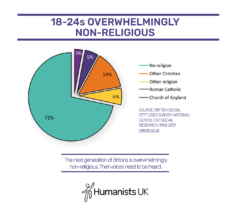 The latest findings of the British Social Attitudes Survey, published today, reveal 71% of 18-24 year olds say they belong to no religion, while just 3% say they are Church of England and 5% say they are Catholic. These latter two figures only increase slightly to 5% and 9%, respectively, amongst 25-34 year olds.
The latest findings of the British Social Attitudes Survey, published today, reveal 71% of 18-24 year olds say they belong to no religion, while just 3% say they are Church of England and 5% say they are Catholic. These latter two figures only increase slightly to 5% and 9%, respectively, amongst 25-34 year olds.
Overall, 53% of the population say they belong to no religion, 15% to the Church of England, 9% to the Catholic Church, 17% to other Christian denominations, and 6% to other religions.
Humanists UK has said the figures must raise fresh questions about the place of the churches in the running of state schools and their other state-funded privileges.
Humanists UK Chief Executive Andrew Copson asked, ‘How can it be right that 97% of young people today are not Anglicans, but some 20% of the state schools to which their children will go belong to the Church of England? More generally, how can the Church of England remain in any meaningful sense the national legally established church, when it caters for such a small portion of the population?’
As of last year, for the first time in history, the Church of England has more children in its state schools worshipping every weekday, than worshippers in its churches every week.
Mr Copson continued, ‘It is clear that the Church of England is experiencing ongoing and probably irreversible collapse in adherents. This should just be its private concern, but the fact that its response to this has been to seek ever more power and public money, even as the case for such state support evaporates, makes it a matter of public interest. It is long overdue that the Government woke up to the demographic reality of today’s Britain and recognises that ever-increasing state funding for religion, and public emphasis on the activities of religious groups, is the reverse of what the public wants.’
Notes
For further comment or information, please contact Humanists UK Director of Public Affairs and Policy Richy Thompson on richy@humanists.uk or 020 3675 0959.
At Humanists UK, we advance free thinking and promote humanism to create a tolerant society where rational thinking and kindness prevail. Our work brings non-religious people together to develop their own views, helping people be happier and more fulfilled in the one life we have. Through our ceremonies, education services, and community and campaigning work, we strive to create a fair and equal society for all.
